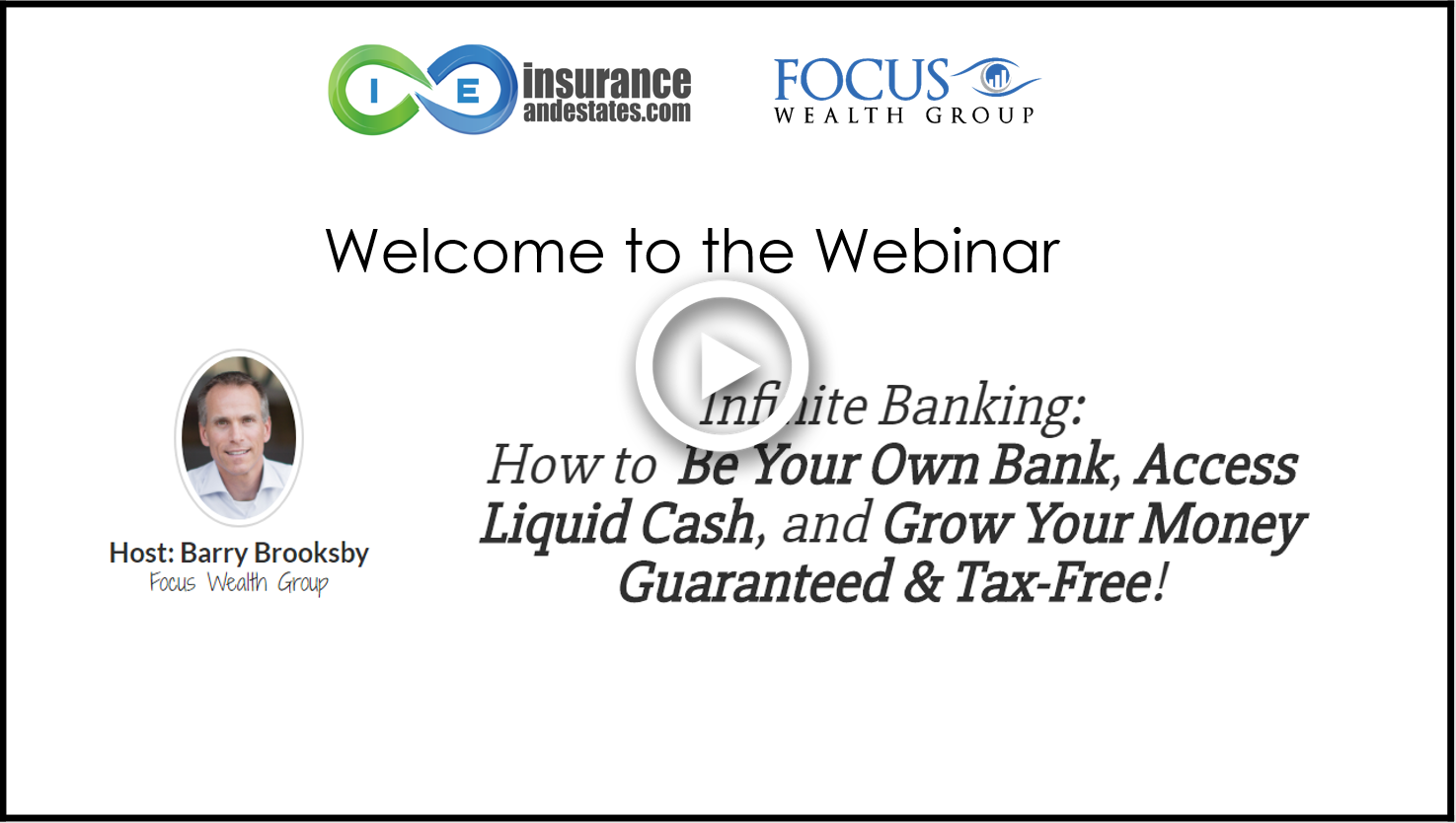Infinite banking is a concept created by Nelson Nash where you “Become Your Own Banker” using a properly designed dividend-paying whole life insurance policy focused on cash value growth and accumulation.
The basic premise of the Infinite Banking Concept is the whole life insurance policy acts as your own personal bank. And for any large purchases or investments, you use the cash value in your policy to fund your investment or purchase.
You then pay yourself back, i.e., your “Bank,” by putting money aside towards your life insurance policy, based on a payback schedule you create.
Free Infinite Banking Webinar

Ideally, you want to pay back the money from your policy that you either withdrew or borrowed against, with interest.
An Infinite Banking Example
For example, if you borrowed $25,000 from your policy to finance a new car purchase, you would then decide on a repayment plan. Perhaps you decide to pay yourself back over five years at a 5% interest rate.
So your payment would be $472 a month. Over the five years, your total payments would be $28,307. You have now recaptured your own interest but as the bank, of $3,307 over the five years.
But here is the kicker.
Not only did you capture the interest, but the cash value in your policy is still growing simultaneously via compound interest. So, you are essentially making your money work for you in two places simultaneously.
Nelson Nash wrote his book many years ago, with subsequent editions. The book Becoming Your Own Banker: Unlock the Infinite Banking Concept is now in its 6th Edition.
Whole Life vs Term Life
There are some similarities and differences when considering term life vs whole life insurance.
The best vehicle for implementing infinite banking is a properly designed dividend-paying whole-life insurance policy focusing on cash value growth versus death benefit protection.
Whole life insurance lasts your entire life, hence the name “whole life.”
In contrast, term insurance lasts for a period of time, i.e., “the term” of the policy. Once term life insurance ends, the coverage stops. It usually can be renewed annually but at increasing premiums.
Term life is a great option when you need coverage to pay off debts or to replace lost income.
However, it is not always the wisest choice to follow the popular mantra “Buy term and invest the rest,” many of today’s financial entertainers spouted.
Infinite Banking Pros
To list the many benefits of infinite banking would be to list many benefits of whole life insurance.
However, what most infinite banking reviews fail to do is list the benefits of infinite banking beyond whole life.
So, our goal here will be to do both.
1. Guarantees
The primary reason for using whole life insurance to fund your “bank” is because of the guarantees it offers.
Whole life insurance offers three primary benefits in the form of guarantees.
The first is a guaranteed death benefit. As long as you make your premium payments, the insurance company guarantees that your death benefit will be paid.
The second is guaranteed cash value growth. Once again, as long as you pay your premium, the insurer guarantees a certain amount of cash value growth.
The third guarantee is a fixed premium payment. The insurer locks in your premium payment for the life of the policy. This is great because you don’t have to worry about your premium increasing as you age.
2. Tax Benefits
Life insurance enjoys some great tax benefits.
Life insurance’s most known tax benefit is the death benefit, which is not taxed to the beneficiary. In rare circumstances, the death benefit may be taxed against the deceased’s estate, but the beneficiary receives the death benefit payout income tax-free.
Further, cash value growth in the policy is tax-deferred. You can withdraw up to the basis of the policy with no tax ramifications.
You can also borrow against the cash value; the life insurance loan is not taxed.
Also, dividends received from the insurance company are considered a return of premium and are similarly not taxable.
3. Compound Interest
The cash value in your policy grows with true compound interest. What we mean by “true” is that the cash value grows without interruption.
As mentioned above, your cash value growth is tax-deferred, so long as you do not withdraw above your basis, you will not be taxed on any gains.
Further, even when you borrow against the cash value in your policy, the cash value continues growing.
For example, if you borrow $50,000, you are taking a loan from the insurance company. The company is using your cash value as collateral.
But the cash value remains in your policy and still earns interest and dividends.
So, even when you are using your cash value elsewhere, compound interest is still doing its magic in your policy.
Free Infinite Banking Webinar

4. Leverage
Life insurance offers a unique characteristic that most assets do not offer: a death benefit.
And the initial death benefit is often much greater than your premium payment.
For example, if you get a $150,000 death benefit policy, your premium might be $12,000 a year or $1,000 a month.
Now, suppose you die after making only one payment into your policy. In that case, the insurance company will pay your beneficiary a $150,000 death benefit, or 150X more than you paid into the policy.
Over time, the leverage benefit will diminish, which means you are still alive, which is a big win.
5. Asset Protection
Life insurance enjoys some excellent asset protection laws. Depending on what state you live in, life insurance may enjoy both creditor protection and bankruptcy protection.
Now, this benefit largely depends on your state. Some states offer much better creditor protection than others.
For example, Florida offers unlimited protection for the cash value of your life insurance policy. In contrast, California only protects up to $15,650 worth of cash value.
You can go to the following to view a list of life insurance creditor protection by state.
6. Living Benefits
Life insurance offers living benefits. A living benefit is beneficial for you in life, as opposed to a death benefit upon your passing.
Some notable living benefits offered with life insurance include an accelerated death benefit and chronic illness rider.
The accelerated death benefit allows the insured to access up to a specified amount of the death benefit if the insured is diagnosed as terminally ill and given a one or two-year window to live.
Likewise, the chronic illness rider pays the insured a percentage of the death benefit if they suffer a qualifying chronic illness.
7. Mindset
Probably the greatest benefit of infinite banking is the accompanying mindset it brings.
Infinite banking has supplied countless people with an entirely new vocabulary, such as cash flow, velocity of money, and recapturing debt.
Life insurance is a valuable asset when used in conjunction with the infinite banking concept. It empowers anyone looking for a way to do things differently than the status quo.
Infinite Banking Cons
1. Nash’s book is not the easiest read.
Nash’s book is a bit dated. His book’s concepts are challenging to follow in today’s numbers.
His writing style can be challenging to follow. He tells many stories that lose a lot of people’s attention.
His book may be confusing and hard to follow for some.
The result is many dismiss infinite banking as a sales tactic from an insurance salesman or, worse yet, as a scam.
Of course, this is not true, as we have outlined the many benefits of infinite banking above. But it is a definite drawback to the concept for some.
2. Requires Discipline
Practicing infinite banking requires discipline. You must fund your bank, which requires years of planning and patience.
Further, you must repay your bank when you take out a loan against the cash value in your policy.
3. Must Qualify
Life insurance is not something anyone can go out and buy. It must be qualified for.
A potential workaround for some people who can’t qualify for life insurance themselves is to get a policy on a loved one, such as a spouse.
Free Infinite Banking Webinar



